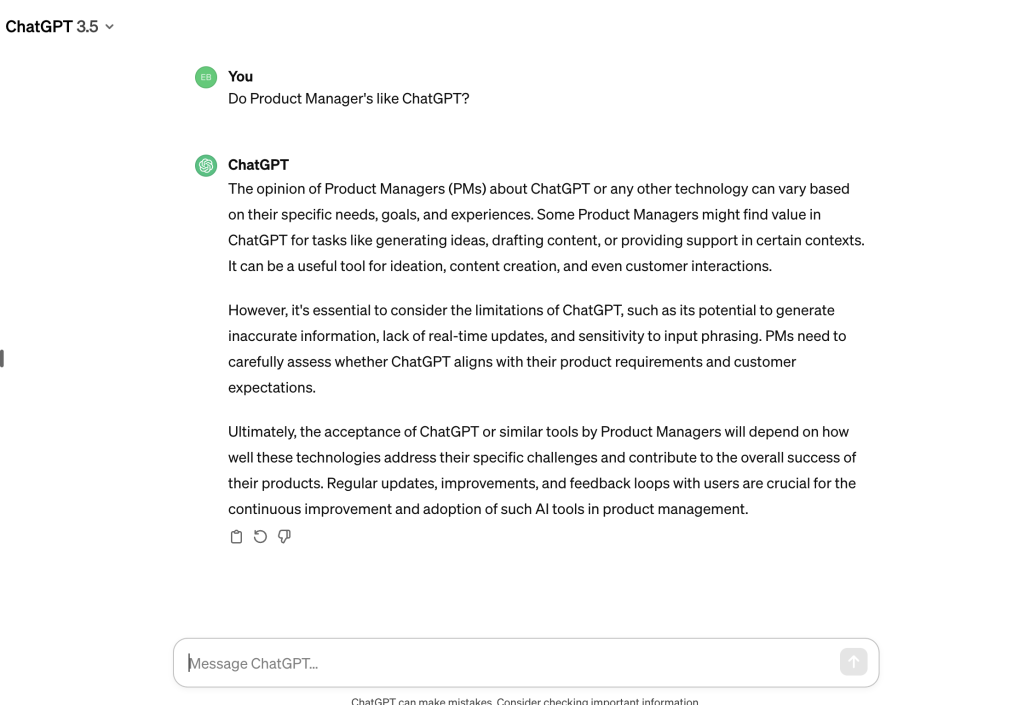Artificial Intelligence (AI) has emerged as a game-changer in almost every industry, and product management is no exception. With its ability to process massive amounts of data, analyze patterns, and make intelligent predictions, AI is revolutionizing the way businesses manage their products. AI for Product Managers is a growing industry and tools like ChatGPT are not just futuristic concepts but practical assets in their everyday toolkit. It’s not a fleeting trend. It’s a fundamental shift in the landscape. In this article, we will explore how AI is unleashing its power in product management and the significant benefits it brings to businesses. From enhancing customer insights to streamlining the product development process, AI is transforming the way companies create, launch, and improve their offerings. Join us as we delve into the world of AI in product management and discover how this groundbreaking technology is reshaping the way businesses innovate and grow.
What is Generative AI for Product Managers?
Generative AI is a groundbreaking technology in artificial intelligence revolutionizing product management by harnessing advanced machine learning algorithms. ChatGPT, a variant of the powerful GPT model developed by OpenAI, exemplifies the capabilities of generative AI in diverse applications beyond traditional question-answering.
This innovative technology is a versatile tool for product managers, facilitating tasks such as generating product descriptions, drafting user stories, and simulating customer interactions. Its ability to create novel content extends to various domains, including language translation, coding assistance, and more. The adaptability of ChatGPT represents a new frontier for product management, offering opportunities to enhance productivity, foster creativity, and gain valuable insights.
AI’s impact on product management extends beyond generative models like ChatGPT. By analyzing extensive data from sources such as social media, customer reviews, and sales data, advanced machine learning algorithms can quickly identify market trends, customer preferences, and competitor strategies. This data-driven approach enables product managers to stay ahead of the competition, reduce time-to-market, and make informed decisions about product development and launch.
Why bother with Generative AI as Product Managers?
The integration of Artificial Intelligence (AI) into product management is more than a technological upgrade; it’s a strategic transformation that brings a multitude of benefits and opportunities to the field. There are two major reasons why AI has become an indispensable tool for product managers:
Enhanced Efficiency: AI automates routine and time-consuming tasks, such as data analysis, user feedback aggregation, and report generation. This automation frees up product managers to focus on more strategic (and let’s be real, more interesting) aspects of their role, such as innovation and long-term planning. AI also improves the accuracy of demand forecasting, a critical aspect of product management. By analyzing historical sales data, market trends, and external factors, AI algorithms can predict future demand with a high level of accuracy. This allows businesses to optimize inventory levels, reduce stockouts, and minimize waste.
- Idea Generation: ChatGPT serves as a brainstorming partner, offering product managers a spectrum of creative ideas and perspectives that might not be immediately obvious. This fosters innovation right from the ideation phase.
- Customer Feedback Analysis: In the age of customer-centric product development, interpreting feedback effectively is key. ChatGPT’s ability to analyze and derive meaningful insights from customer feedback allows for more responsive and informed product iterations.
Improved Customer Insights and Engagement: AI tools can analyze customer feedback, social media interactions, and behavior patterns. This enhances customer insights that product managers can use to their advantage. It empowers businesses to tailor their products, improve customer satisfaction, and maximize sales. The transformative role of AI in product management signifies a shift from traditional reliance on market research and intuition to a more dynamic and data-centric decision-making process. In this evolving landscape, AI serves as a valuable ally, providing tools and insights that elevate the effectiveness of product managers in today’s competitive markets.
- Market Research: Analyzing market trends and understanding competitor strategies can be a daunting task. ChatGPT simplifies this by processing large datasets and providing succinct, insightful summaries.
- User Story Creation: In product development, crafting user stories that resonate with end-users is crucial. ChatGPT aids in creating comprehensive and empathetic user stories, ensuring products meet real user needs.

Download our ebook about prompt engineering
Learn how to be an AI-powered PM. Get the 350+ Prompts for Product Managers E-Book
Integrating ChatGPT into the Product Lifecycle
We’ve identified 4 methods product managers can employ ChatGPT and other AI tools in the product lifecycle:
- Initial Stages – Ideation and Conceptualization: In the early stages of product development, ChatGPT can be a powerhouse for brainstorming. It aids in generating a diverse range of product ideas and conceptual frameworks. Product managers can leverage its capability to produce innovative concepts, enriching the ideation phase with AI-powered creativity.
- Development Phase – User Stories and Requirement Gathering: As the product moves into the development phase, ChatGPT’s role becomes pivotal in shaping user stories and refining product requirements. It helps in articulating user needs and expectations more accurately, ensuring that the product aligns with its intended market and user base.
- Pre-Launch – Market Analysis and Strategy Development: Before launching the product, understanding the market is crucial. Here, ChatGPT contributes significantly by analyzing market trends, competitor strategies, and customer sentiments. This phase benefits immensely from ChatGPT’s ability to synthesize large amounts of data into actionable insights, aiding in the formulation of robust market strategies.
- Post-Launch – Feedback Interpretation and Iteration: Post-launch, product managers face the critical task of gathering and interpreting customer feedback. ChatGPT streamlines this process, providing quick and comprehensive analysis. This allows for agile iterations and updates to the product, ensuring it continues to meet customer needs and market demands effectively.
Seamless integration of ChatGPT into the product development process can significantly boost productivity and innovation. The integration of ChatGPT into the product development process marks a significant shift in how product management is traditionally approached. This integration isn’t just about adding a new tool; it’s about strategically enhancing the entire lifecycle of product management with AI-driven insights and efficiency. We talk more about how you and your team can use AI at all levels of the product lifecycle in our AI-Powered Product Management MasterClass.
Best Practices for Seamless Integration
We’ve identified 4 best practices for Product Managers when leveraging AI:
- Clear Objective Setting: Define specific goals for ChatGPT use at each stage of the product lifecycle. This ensures that its integration is purposeful and aligned with the overall product strategy.
- Training and Adaptation: Equip your team with the necessary training to effectively use ChatGPT. Familiarity with the tool’s capabilities and limitations ensures more effective integration and adaptation to the team’s workflows.
- Data-Driven Decision Making: Use ChatGPT to supplement data-driven decision-making processes. Its ability to process and analyze large datasets enhances the quality of decisions made throughout the product lifecycle.
- Continuous Monitoring and Evaluation: Regularly evaluate the impact of ChatGPT on your product development processes. This helps in identifying areas of improvement and ensures the tool’s contribution remains aligned with the desired outcomes.
In essence, integrating ChatGPT into product management is about enhancing each phase of the product lifecycle with intelligent, data-driven insights. It’s a strategic move towards more informed decision-making, creativity, and responsiveness in the ever-evolving domain of product management.
We have come up with 4 key challenges product managers need to be aware of when using AI:
- Balancing AI with Human Expertise: One of the primary challenges product managers struggle with is ensuring that ChatGPT complements rather than replaces human judgment. Product managers must strike a balance, leveraging AI for efficiency and data processing, while relying on human expertise for creative and ethical decision-making.
- Data Privacy and Security: As ChatGPT processes vast amounts of data, ensuring the privacy and security of this data, especially when it involves sensitive customer information, is paramount. Compliance with data protection regulations like GDPR is a crucial consideration.
- Managing AI Biases: AI models, including ChatGPT, may inadvertently reflect biases present in their training data. Product managers need to be aware of and actively manage these biases to ensure fair and unbiased outputs.
- Team Adaptation and Training: Integrating ChatGPT into existing workflows can be met with resistance or a learning curve. Teams need adequate training to understand and utilize the tool effectively. The the lack of skilled talent in AI and data science is an issue. Hiring or up-skilling existing employees in these areas can help bridge the gap and ensure successful implementation.
- At Mesh Firm we offer trainings and classes to product managers and their teams so that they can leverage AI in their work while managing these challenges. Check them out here:
Product managers must establish clear objectives for using ChatGPT, maintain a balance between AI and human inputs, and continuously monitor and evaluate its performance.
Integrating an advanced AI tool like ChatGPT into product management processes is a forward-thinking move, but it comes with its own set of challenges. Successfully navigating these challenges requires a blend of strategic planning, best practices, and a keen understanding of the tool’s capabilities and limitations.
By addressing these challenges and adhering to best practices, product managers can effectively harness the power of ChatGPT, turning potential obstacles into opportunities for growth and innovation. The goal is to create a synergy between AI’s capabilities and human expertise, driving forward a new era of product management that is more efficient, insightful, and responsive to market and customer needs.
Hear experts from Mesh Firm discuss AI for Product Managers on our podcast Product Disorder.

Use Cases for AI in Product Management
Several businesses have already embraced AI in their product management processes and witnessed significant benefits.
Amazon uses AI algorithms to analyze customer behavior, predict buying patterns, and recommend products. This has resulted in improved customer satisfaction, increased sales, and higher conversion rates.
Netflix leverages AI to personalize the user experience and recommend movies and TV shows based on individual preferences. This has led to higher customer engagement, increased subscriptions, and reduced churn rates.
We partnered with Ørsted, a leading offshore wind power plant operator, to create a comprehensive digital product catalog that streamlines their operations and enhances their service offerings. As part of this incredible growth journey the offshore operations team needed to restructure their product management organisation to ensure the delivery of relevant products. In this case we used AI for (1) Drafting and improving Epic descriptions, (2) Improving Product Roadmap (3) Creating the Product Catalog.
We also partnered with MÆT Pets, a Danish eCommerce company specializing in fresh dog food made from high-quality Nordic ingredients. Their product range includes fresh meals, natural snacks and toys for dogs. Mæt Pets focuses on delivering complete meals, ensuring that dogs enjoy a balanced diet that is both delicious and nutritious. In this case we used AI for (1) Writing copy for various ad formats, such as Social Media ads and Google Ads, (2) Creating images and creatives for social media ads, (3) Creating outlines and content for Conversion Rate Optimized landing pages, (4) Writing blog posts around specific SEO keywords, (5) Helping in negotiation situations.
We leverage AI in all that we do at Mesh Firm. You can read about some of our own use cases of AI in our interim product management work here: Mesh Firm Client Cases.
Ethical Considerations and Responsible AI Use
We have identified a number of downsides inherent in the use of AI for product management:
Ethical Considerations in AI Deployment
- Transparency in AI Usage: Be transparent about the use of AI in product management processes. This includes informing stakeholders when AI-generated content or insights are being used, thereby maintaining honesty and trustworthiness.
- Avoiding Misuse of AI Capabilities: It’s essential to prevent the misuse of AI tools, whether in manipulating user opinions, infringing on privacy, or creating deceptive content. Ethical deployment means using AI to enhance user experiences and make informed decisions, not to mislead or manipulate.
Data Privacy and Security:
- Safeguarding Sensitive Information: With AI’s ability to process large datasets, including sensitive customer information, adhering to strict data privacy practices is non-negotiable. This includes compliance with global data protection regulations and implementing robust security measures to protect data integrity.
- Consent and Anonymization: Wherever possible, use anonymized data, and ensure that data collection and processing are done with user consent, respecting their privacy and rights.
Addressing AI Bias and Fairness
- Acknowledging and Mitigating Biases: AI systems, including ChatGPT, can inherit biases from their training datasets. It’s important to recognize this and take steps to mitigate bias, ensuring that AI-generated insights and decisions are fair and unbiased.
- Diverse Data and Continuous Monitoring: Utilize diverse datasets for training AI models and continuously monitor AI outputs for any signs of bias or skewed results. Regular audits and adjustments to the AI model are essential to maintain fairness.
Responsible AI Use:
- Ongoing Monitoring and Adaptation: AI is not a set-and-forget tool. It requires ongoing monitoring to ensure its outputs remain accurate, relevant, and ethical over time. Be prepared to adapt AI use as its capabilities evolve and as new ethical considerations arise.
- Collaborative Decision-Making: AI should support, not replace, human decision-making. Ensure that final decisions, especially those affecting users or strategic directions, involve human judgment and ethical considerations.
Ethical use of AI tools like ChatGPT is paramount. Neglecting to consider the downsides of AI can threaten the utility of a product. Product managers need to be mindful of potential biases in AI, ensure transparency in its usage, and prioritize data privacy and security. Regular audits and adherence to ethical guidelines are crucial for responsible AI use.
Conclusion
ChatGPT stands as a testament to the potential of AI in transforming product management. As AI continues to evolve, staying informed and adaptable is key for product managers. Continuously ask yourself and reconsider the question: What is the future of AI in product management?
Embracing AI tools like ChatGPT can lead to unprecedented growth and innovation in product development, provided they are used responsibly and ethically. So, are you ready to unleash the power of AI in your product management? Embrace the future and unlock new possibilities for your business.
To learn more check out our podcast Product Disorder where we talk about what we, the experts at Mesh Firm, think about AI, Agile, and the Future of Product Management.
Will AI take over product management?
AI may augment certain aspects of product management, but human oversight and strategic decision-making will remain essential.
How do you become a good PM in AI?
To become a PM in AI, acquire a combination of technical expertise, business acumen, and understanding of AI principles and applications. You can start by joining our MasterClass.
How can I be a good AI product manager?
Being a good AI product manager entails effectively bridging the gap between technical teams, understanding user needs, and driving successful product development.
Are AI product managers in demand?
Yes, AI product managers are increasingly in demand as companies seek to leverage AI technologies in their products and services.


